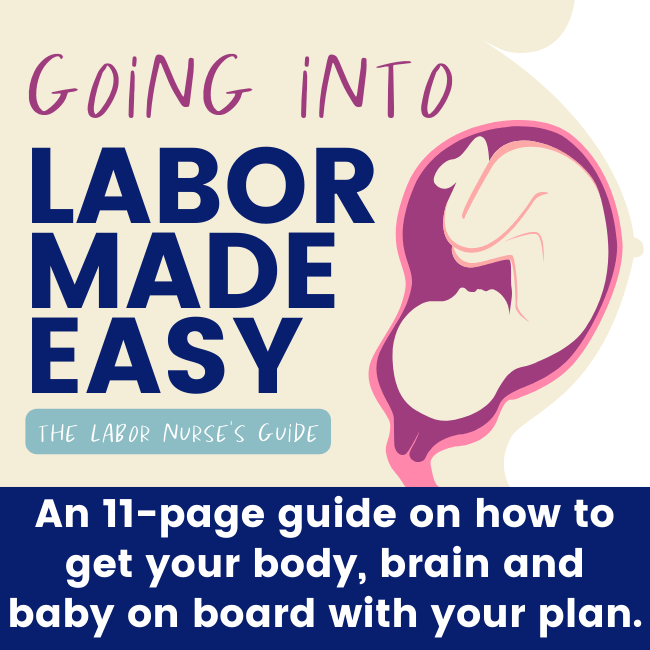Midwives Brew is a popular tea blend that is often recommended to pregnant women. But is it safe? This blog post will explore the safety of Midwives Brew and answer any questions you may have about it.
Nine months is a long time to wait for labor to start naturally.
Most pregnant women will tell you that the last thing they want to do is wait for labor to start naturally. This can be an especially long and arduous process if your baby decides to come late.
Many people feel like midwives’ brew is a safe and natural way to induce labor. This brew is made with all-natural ingredients and has been used by many women and midwives to bring on quick, natural labor. It can be made within minutes and consumed whenever you prefer. However, even though it is “safe” and made with natural ingredients, pregnant women shouldn’t consume it before getting approval from their medical practitioner or midwife.
But first, how do I know all of this?
Hi — I’m Hilary — The Pregnancy Nurse 👩⚕️. I have been a nurse since 1997 and I have 20 years of OB nursing experience, I am also the curly head behind Pulling Curls and The Online Prenatal Class for Couples. 🩺 I have talked to THOUSANDS of moms desperate to have their baby (millions if you count online dm’s or emails) and I’ve seen patients who’ve taken castor oil — so I can really tell you what to expect.
What is Midwives Brew?
Midwives Brew is a popular tea blend that is often recommended to pregnant women.
It contains:
- Castor oil– this is the main ingredient, and often women will take castor oil alone (which I do NOT recommend). It causes your colon to spasm (and I’m guessing you can figure out what that creates) and then gets your uterus to contract too.
- Almond butter- the fat in this helps to ease the spasms (and maybe the castor oil doesn’t rip through your digestive tract as fast).
- Lemon verbena tea- mostly just for taste, but it can also help calm you, always a nice thing.
- Apricot juice– Also just for taste, but it’s got some vitamins and minerals in there too.
And no, I’m not going to tell you exactly how to make it. Plenty of places on the internet do, but I would REALLY encourage you to talk to your provider before you consider it.
Worried about talking to your provider? I have a whole lesson on communicating with your healthcare team in here that people absolutely love. You really can get the information you want and need from your team in a respectful, easy way!
How safe is midwives’ brew?
Honestly, the actual evidence isn’t great as far as safety. There isn’t a whole lot known.
What are the risks of consuming Midwives Brew?
Even though Midwives Brew is made with all-natural ingredients, it is important to get the okay from your medical practitioner or midwife before consuming it. This is because there are always risks associated with consuming any type of herbal tea, especially when you are pregnant. Some of the potential risks include:
Allergic reactions: Anytime you consume something new, there is always a risk of having an allergic reaction. If you have never consumed Midwives Brew before, it is important to be aware of the potential risks and be sure to watch for any signs of an allergic reaction, such as hives, difficulty breathing, or swelling of the face, lips, or tongue. Especially important as this has almond butter, which is a common allergen.
Interference with medications: Some of the ingredients in some Midwives Brews, such as ginger, can interfere with certain medications. If you are taking any medications, be sure to check with your doctor or pharmacist before consuming this tea.
Dehydration: Herbal teas, in general, can cause dehydration if they are consumed in large quantities. This is especially true for Midwives Brew, which contains diuretic herbs like ginger and dandelion root. Dehydration can be dangerous for both you and your baby, so it is important to make sure you are drinking plenty of water throughout the day if you plan on consuming this tea.
Extreme diarrhea: And when I say extreme, I mean extreme. The whole idea behind this brew is that you get your colon contracting and then your uterus gets going also. Meaning you’re also losing a LOT of fluids through that diarrhea, which isn’t great for you and the baby. The stress from this may also impact the baby and can have serious effects, including the baby passing meconium in the amniotic fluid.
I have also heard some anecdotal things about the castor oil passing to the baby (and them having diarrhea) which, as you can imagine, is not good.
What is the evidence for midwives brew?
There are a few studies….
This one showed that it was safe for mom and baby, although mom definitely had some negative side-effects, none were long-term.
This one showed that there wasn’t a big difference in the time til’ labor between those who drank castor oil and those who didn’t.
This one is probably the most interesting. In it, 30 of 52 women who recieved castor oil (57.7%) began active labor compared to 2 of 48 (4.2%) receiving no treatment. And those who went into labor on their own, 83% had a vaginal delivery.
None really showed negative side effects, which is awesome — but these studies are fairly small, some are old and many didn’t really take into account all the issues that could arise (and many had questionable techniques).
Another one I get asked a lot about is primrose oil for induction << that post has studies on it as well.
Are there Alternatives to Induce Labor?
There are other ways to induce labor.
1. Membrane stripping: This is when your provider separates the bag of waters from the uterine wall. It can sometimes jump-start labor, but not always.
2. Pitocin: This is a medication given through an IV that can help to induce or speed up labor. Learn more about what to expect with a Pitocin induction.
3. Balloon catheter: This is a device that is inserted into the cervix and then inflated. It helps to stretch the cervix and can sometimes trigger labor.
4. Herbal tinctures or teas: There are many herbs that are thought to help induce labor, such as red raspberry leaf, black cohosh, blue cohosh, and evening primrose oil. It is important to speak with your provider before taking any of these herbs, as some can be unsafe during pregnancy.
5. Spicy food: Eating spicy food is sometimes said to help induce labor, although there is no scientific evidence to support this claim.
6. Sex: orgasm can sometimes help to trigger labor. This is because the hormone oxytocin is released during orgasm, which can help to stimulate contractions.
7. Acupuncture: There is some evidence to suggest that acupuncture can help to induce labor.
8. Walking: Walking is a great way to encourage your baby to move down into the pelvis and may help to start labor.
9. Nipple stimulation: This is when you stimulate the nipples, which can help to release oxytocin and cause contractions. It is important to only do this after talking to your provider, as it can sometimes cause the baby’s heart rate to drop.
10. Cervical Ripening agents: These are medications such as Cytotec or Cervidil they can use to start contractions (and they don’t use your stomach to get the contractions going).
You’ll notice that some of these ways are medical (and more proven) and some are things that you can try at home.
What does the pregnancy nurse think of midwives brew?
I don’t love it.
If I can be frank, the problem is the poop. Lots, and lots of poop.
Imagine you’re in labor, as uncomfortable as can be — and you’re just pooping over, and over and over. Diarrhea everywhere. Stomach cramps in addition to labor cramps. I do have a whole post on avoiding pooping at delivery (and this is NOT one of the ways).
The patients who I have had who have taken it have regretted it. And I have seen babies have meconium because mom was stressed (or possibly because castor oil passes to them, although I don’t see any studies that relate that).
Ultimately, if you REALLY want to have your baby talk to your provider.
If you’re before 39 weeks, it really isn’t advisable to be induced. Yes, your body may go into labor naturally, but it is better for your baby to make up its own mind as to when it’s ready to come.
If you’re after 39 weeks, most providers will offer an elective induction if you are that uncomfortable.
And of course, there are medical reasons that you might need to be induced earlier (even at 37 weeks), and if that is the case you wouldn’t want to use something with as many side effects as castor oil can bring.
It seems like you’re ready for lots of good information about your pregnancy. This class guarantees to prepare you for a confident birth. We’ll talk about medical and natural ways to stay healthy during pregnancy and labor. I think you’ll love it. Save 10% with coupon code PREGNURSE.
Looking to get prepare for your birth? I have some easy options for you!
~~~~~~~~
– Worried you’re missing something? Grab my pregnancy planner so you don’t miss a thing!
– Thinking about an induction? Grab Inductions Made Easy to feel prepared in just 20 minutes!
– Wondering how to get that baby OUT? Grab Going Into Labor Made Easy so you know how to (and not to) do it!
– Postpartum got you anxious? Check out Postpartum Care Made Easy so you can stay SAFE even when all your attention is on that little on.
🚨 AND if ALL OF IT has got you on edge The Online Prenatal Class for Couples is perfect for you — You’ll feel so ready before you even know it!
~~~~~~~~
No matter WHERE you are at in your pregnancy journey, we have resources that can help!
Want to do a vibe check before diving into the whole thing with me? — check out my free labor pro tips. It’s your first step toward getting in the driver’s seat of your birth.





 Latent Labor: Early Labor to Active Labor
Latent Labor: Early Labor to Active Labor
